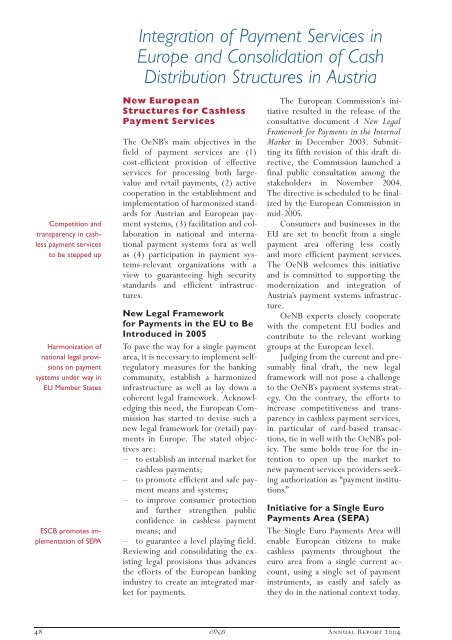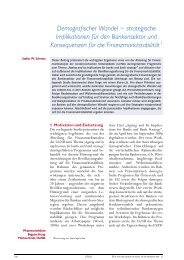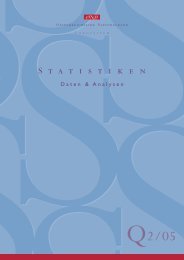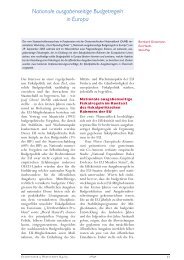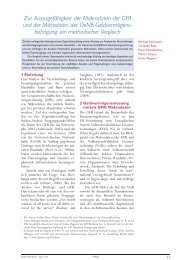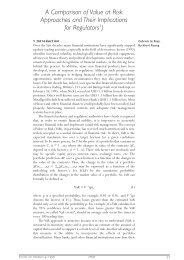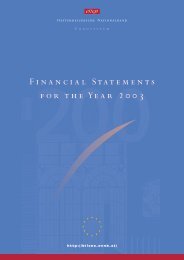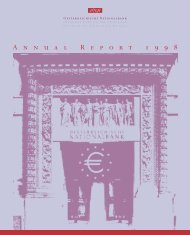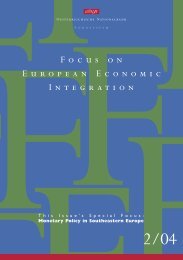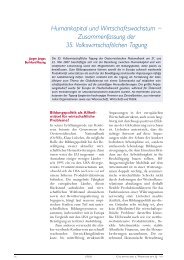You also want an ePaper? Increase the reach of your titles
YUMPU automatically turns print PDFs into web optimized ePapers that Google loves.
Competition and<br />
transparency in cashless<br />
payment services<br />
to be stepped up<br />
Harmonization of<br />
national legal provisions<br />
on payment<br />
systems under way in<br />
EU Member States<br />
ESCB promotes implementation<br />
of SEPA<br />
Integration of Payment Services in<br />
Europe and Consolidation of Cash<br />
Distribution Structures in Austria<br />
New European<br />
Structures for Cashless<br />
Payment Services<br />
The OeNBÕs main objectives in the<br />
field of payment services are (1)<br />
cost-efficient provision of effective<br />
services for processing both largevalue<br />
and retail payments, (2) active<br />
cooperationintheestablishmentand<br />
implementation of harmonized standards<br />
for Austrian and European payment<br />
systems, (3) facilitation and collaboration<br />
in national and international<br />
payment systems fora as well<br />
as (4) participation in payment systems-relevant<br />
organizations with a<br />
view to guaranteeing high security<br />
standards and efficient infrastructures.<br />
New Legal Framework<br />
for Payments in the EU to Be<br />
Introduced in 2005<br />
To pave the way for a single payment<br />
area, it is necessary to implement selfregulatory<br />
measures for the banking<br />
community, establish a harmonized<br />
infrastructure as well as lay down a<br />
coherent legal framework. Acknowledging<br />
this need, the European Commission<br />
has started to devise such a<br />
new legal framework for (retail) payments<br />
in Europe. The stated objectives<br />
are:<br />
— to establish an internal market for<br />
cashless payments;<br />
— to promote efficient and safe payment<br />
means and systems;<br />
— to improve consumer protection<br />
and further strengthen public<br />
confidence in cashless payment<br />
means; and<br />
— to guarantee a level playing field.<br />
Reviewing and consolidating the existing<br />
legal provisions thus advances<br />
the efforts of the European banking<br />
industry to create an integrated market<br />
for payments.<br />
The European CommissionÕs initiative<br />
resulted in the release of the<br />
consultative document ANewLegal<br />
Framework for Payments in the Internal<br />
Market in December 2003. Submitting<br />
its fifth revision of this draft directive,<br />
the Commission launched a<br />
final public consultation among the<br />
stakeholders in November <strong>2004</strong>.<br />
The directive is scheduled to be finalized<br />
by the European Commission in<br />
mid-2005.<br />
Consumers and businesses in the<br />
EU are set to benefit from a single<br />
payment area offering less costly<br />
and more efficient payment services.<br />
The OeNB welcomes this initiative<br />
and is committed to supporting the<br />
modernization and integration of<br />
AustriaÕs payment systems infrastructure.<br />
OeNB experts closely cooperate<br />
with the competent EU bodies and<br />
contribute to the relevant working<br />
groups at the European level.<br />
Judging from the current and presumably<br />
final draft, the new legal<br />
framework will not pose a challenge<br />
to the OeNBÕs payment systems strategy.<br />
On the contrary, the efforts to<br />
increase competitiveness and transparency<br />
in cashless payment services,<br />
in particular of card-based transactions,<br />
tie in well with the OeNBÕs policy.<br />
The same holds true for the intention<br />
to open up the market to<br />
new payment services providers seeking<br />
authorization as Òpayment institutions.Ó<br />
Initiative for a Single Euro<br />
Payments Area (SEPA)<br />
The Single Euro Payments Area will<br />
enable European citizens to make<br />
cashless payments throughout the<br />
euro area from a single current account,<br />
using a single set of payment<br />
instruments, as easily and safely as<br />
they do in the national context today.<br />
48 ×<br />
<strong>Annual</strong> <strong>Report</strong> <strong>2004</strong>


